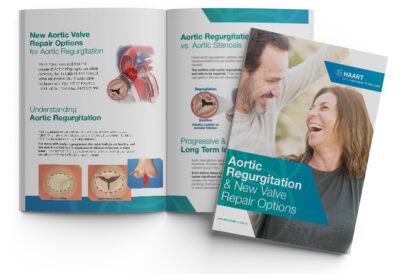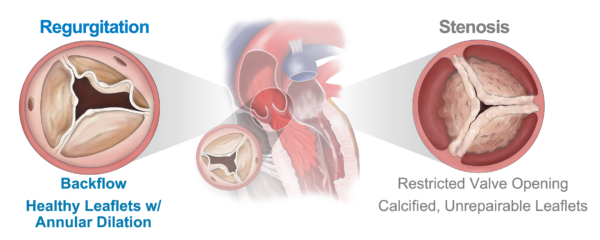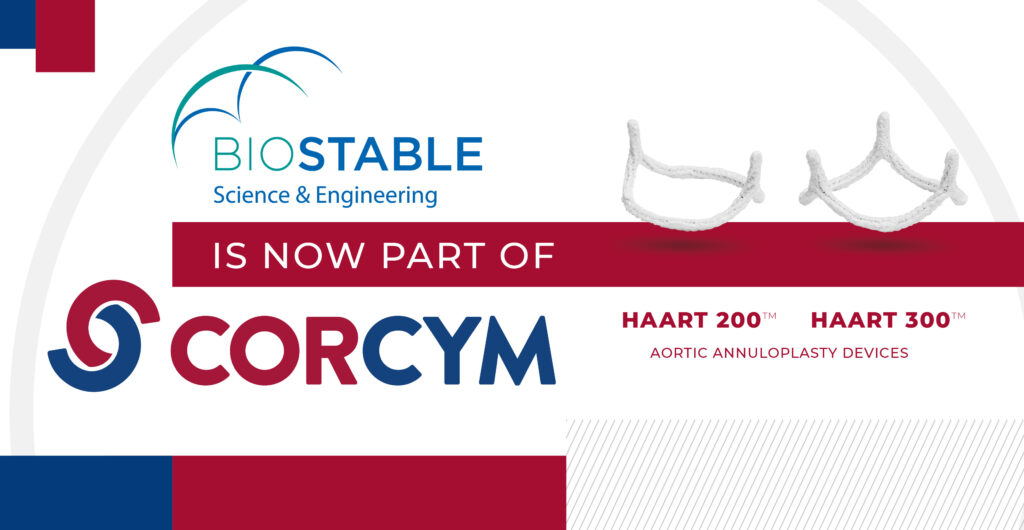
New Aortic Valve Repair options for Aortic Regurgitation
Valve repair can address the cause of Aortic Regurgitation while avoiding the limitations and risks of valve replacements. A total valve replacement may not be required. Learn about new treatment options.
Get Your Free Aortic Valve Repair
Info Kit Now!

Understanding Aortic Regurgitation
Aortic regurgitation is a condition where the aortic valve doesn’t close tightly. When the valve is closed, some of the blood leaks back into the left ventricle (the heart’s main pumping chamber).
For many with aortic regurgitation, the valve leaflets are healthy, and the leak is caused by the expansion or dilation of the aortic valve base. This expansion of the valve base prevents the valve from closing well and allows for blood to flow back into the heart.
Aortic Regurgitation vs. Stenosis
Unlike aortic regurgitation, patients with aortic stenosis typically have diseased leaflets that are calcified and rigid and are not able to be repaired.
The leaflets with aortic regurgitation are typically flexible, mobile and able to be repaired. There are some types of leaflet defects with regurgitation that are not repairable.

Progressive & Long Term Impacts
Aortic regurgitation typically develops gradually with symptoms such as shortness of breath, fatigue, heart murmur, irregular pulse and others worsening over time.
Even before these symptoms present, the aortic regurgitation can cause significant long-term damage to your heart. The leaky valve causes your heart to work harder and the pressures in your heart’s main pumping chamber to increase. This strain can weaken your heart’s ability to pump and lead to long-term scarring of the heart muscle.
Treatment Options
There are a number of treatment options for those with aortic regurgitation. Medications can help to manage the symptoms and can reduce the strain on your heart but they don’t treat the cause of the leak or limit the progression of the disease. To repair the leak there are several surgical procedures that can directly address the cause and prevent further strain on your heart.
Aortic Valve Repair
For patients with aortic regurgitation, valve repair is often the preferred option. Valve repair addresses the expansion of the valve and allows for preservation of the healthy leaflets. With valve repair, the base of the valve is reduced to the point where the leaflets close tightly, ensuring blood doesn’t flow back into the heart.
Preserving and repairing the valve provides unique advantages[1]:
- No need for life-long blood thinners (Required with mechanical valve replacements and often pose risks of stroke and other side effects)
- Excellent Durability – Valve repair is known to have excellent durability in comparison to biologic valves
- Fewer valve related complications
- Improved long-term survival [2]
The HAART devices are the first implants that are specifically designed to simplify aortic valve repair procedures. The system features innovative instrumentation to ensure the valve is sized for the patient’s anatomy and an implant that is designed to restore the 3-dimensional valve shape found in healthy hearts with good leaflet closure.
Replacements – Mechanical & Biologic
If a patient’s leaflets are not healthy or able to be repaired, replacements can be a good option but present some limitations. With replacement devices, the valve leaflets are removed and replaced with a mechanical valve or a biologic tissue valve (often made from cow or pig heart tissue).
Mechanical valves are very durable and can last for 20+ years but patients are required to be on blood thinning medications. These medications have side effects, including a risk of stroke. With a biologic valve, there is no need for lifelong blood thinners but the durability of the device is limited and there is risk of the device wearing out.

1) Vahanian A. et al. 2021 ESC/EACTS Guidelines for the management of valvular heart disease: European Heart Journal, 2021
2) de Meester, C., et al. (2019). “Do Guideline-Based Indications Result in an Outcome Penalty for Patients With Severe Aortic Regurgitation?” JACC Cardiovasc Imaging.
